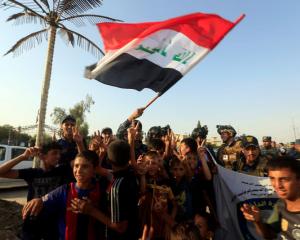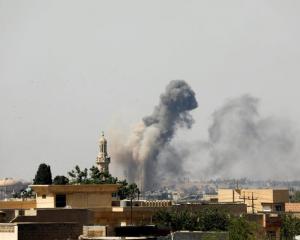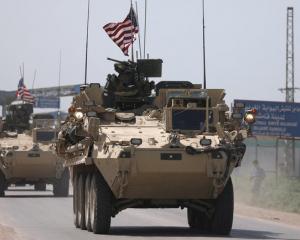Four bombs have ripped through Shiite neighbourhoods in Baghdad, killing at least 40 people in the worst violence the capital has seen in months, Iraqi officials said. An American civilian aid specialist working to improve education in Iraq was killed in a separate attack.
The violence underscored the fragile nature of the security gains in Iraq at a time when American forces are preparing to withdraw by the end of this year and the challenges facing the State Department personnel and American contractors who would continue on after the US military is gone.
The first three bombs went off in quick succession in a southwestern Baghdad neighbourhood shortly after 7pm (local time). One targeted a Shiite mosque, another exploded just outside a popular market, while the third went off inside the market where people were doing their evening shopping ahead of the Muslim weekend, Iraqi police officials said.
The officials said 34 people died and 82 others were injured in the three blasts. An official from Baghdad's Yarmouk hospital confirmed the casualty figures.
An Iraqi resident, Jabir Ali, said he was about 200m away when one of the bombs went off near a barber shop where his cousin works.
"I saw many people killed and injured. I went to see my cousin. The glass at his shop was broken and he was injured in his head, chest and hand by the glass," said Ali, who drove his cousin to the hospital.
About an hour later, a parked car bomb targeting a police patrol killed six people, including one policeman and five bystanders in a different neighbourhood in southwestern Baghdad, said hospital officials.
The officials all spoke on condition of anonymity because they were not authorized to speak to reporters.
There was no immediate claim of responsibility, but Sunni extremists such as al-Qaida in Iraq generally tend to target Shiite mosques and neighbourhoods and Iraqi security forces.
It was the worst attack in the capital since a parked car bomb exploded near a mourning tent in a northern Baghdad neighbourhood in January, killing 48 people.
The American civilian killed earlier on Thursday was Dr. Stephen Everhart, said a US State Department spokeswoman, Victoria Nuland.
"Dr. Everhart was an American citizen who was working in Iraq for an implementing partner of the United States Agency for International Development's Mission in Iraq. He was killed while working on a project to introduce a new business curriculum to a Baghdad university in a program supported by the Iraqi Ministry of Higher Education," she said in a statement.
"We are saddened by this tragedy and extend our thoughts and prayers to Dr. Everhart's family and loved ones, and to the three other injured victims and their families," she said.
Everhart worked at the American University in Cairo, where he was associate dean of the Business School and a finance professor. Before joining AUC, he worked extensively with the World Bank and the Overseas Private Investment Corporation, a US government agency designed to help businesses break into developing markets.
He also wrote articles on topics like international aid, corruption and financial markets.
The State Department gave no information about how he was killed, but an Iraqi police official said the American contractors were visiting a satellite office of Mustansiriyah University in eastern Baghdad when they were hit by a roadside bomb.
It was not known whether the assailants knew Americans were in the convoy or not. It is extremely rare for an American working so closely with the State Department to be killed.
Shiite militias who operate in the nearby neighbourhood of Sadr City have stepped up attacks against the US military in recent months and threatened violence against other American targets. Nine American soldiers have been killed in Iraq so far this month, one of the highest death tolls in two years.
The US military has also accused Shiite militias of lobbing mortars and rockets at the US Embassy in the Green Zone.
Shiite militias are trying to claim they are driving the US military from Iraq and make the US think twice before agreeing to have US troops stay in the country past the December 31 date by which they're slated to go home.
The attack against Everhart and the other contractors could have serious repercussions for the US Embassy in Baghdad and the ability to conduct operations in the country. Already, US Embassy staff and contractors working with agencies such as USAID generally travel in armoured vehicles with guards and sometimes with US military assistance.
Earlier this week, a convoy carrying French Embassy staff was targeted by a roadside bomb in the Karradah neighbourhood. No-one was killed in that incident.









